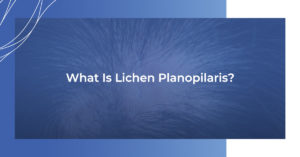
Anyone can develop LPP, but it occurs most frequently in young adult women. It often is found in tandem with lichen planus – a related condition that impacts the skin, nails, and mucosa.
Although LPP is a rare condition, it is one of the most common causes of scarring-related hair loss. Unfortunately, there is limited research data, so its cause is still unknown. It is thought to be autoimmune in nature, and it may be related to other autoimmune diseases like lupus, vitiligo, and Sjogren’s syndrome.
What Does Lichen Planopilaris Look Like?
Lichen planopilaris appears as smooth – often shiny or follicle-free – patches of scalp hair loss. Before the hair falls out, follicles may develop redness or scaliness… and the root of the hair may feel sharp or spiny.
In this stage discomfort is likely, and hair is easily pulled out. Multiple patches of hair loss may develop and then merge into a single, larger area. Common locations for LPP are the front, sides, and lower back of the scalp.
Can Lichen Planopilaris Clear Up On Its Own?
It is possible for LPP to go into remission without treatment, but it is not advisable to avoid seeking the services of a medical professional. If LPP goes untreated, permanent hair loss is highly likely.
Current treatment for LPP typically consists of a combination of topical and/or injected steroids, and orally administered hydroxychloroquine. These drugs help reduce inflammation and slow the progression of the condition.
This protocol is often used in tandem with the application of Minoxidil to help regrow hair in the surviving follicles. Supplemental treatments gaining in popularity are low-level light therapy and vitamin D therapy.
Can Hair Grow Back After Lichen Planopilaris?
Because LLP damages the follicle, hair loss is usually permanent. The condition cannot be cured but treatment may slow the progression and preserve the remaining hair. Unfortunately, it can’t regrow hair in follicles that have already been damaged… which is why swift treatment is important. In some cases, hair restoration may be an excellent option for LPP-related hair loss, especially if the condition has been dormant for over a year with no recurrence.
RHRLI Are Experts in Hair Restoration
At RHRLI we provide a variety of treatment options to address many different types of alopecia. Advancements in the treatment of hair loss – such as the FDA-approved ARTAS® Robotic Hair Transplant System – can help you get confidence-boosting, natural-looking results. To schedule a free consultation and scalp assessment, contact us today to get started.
